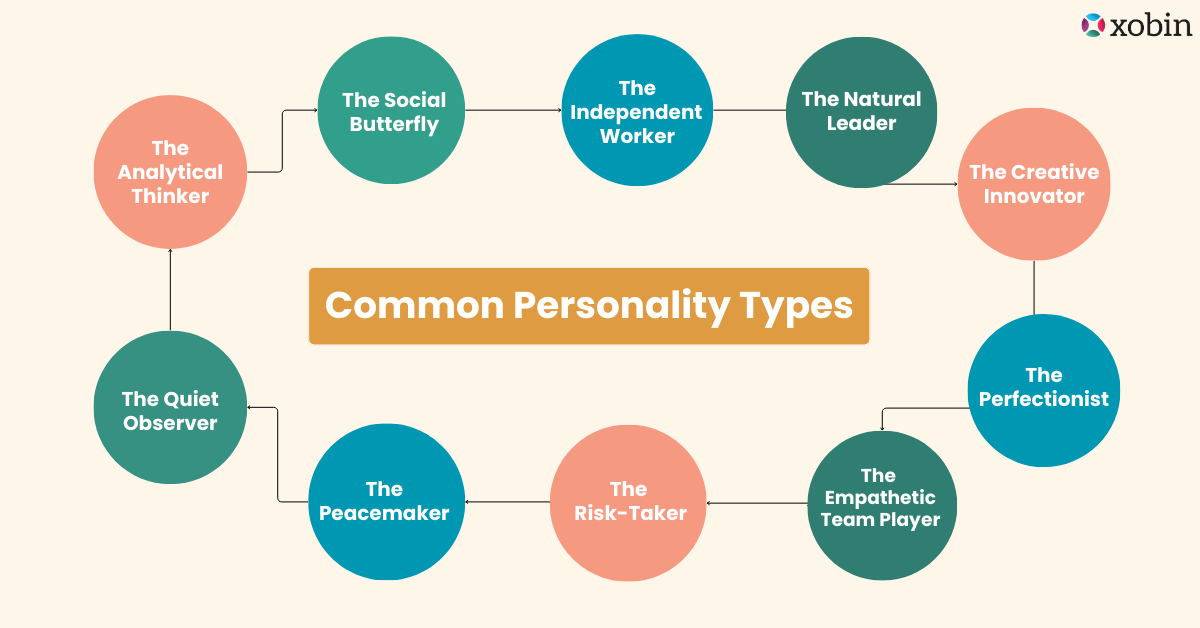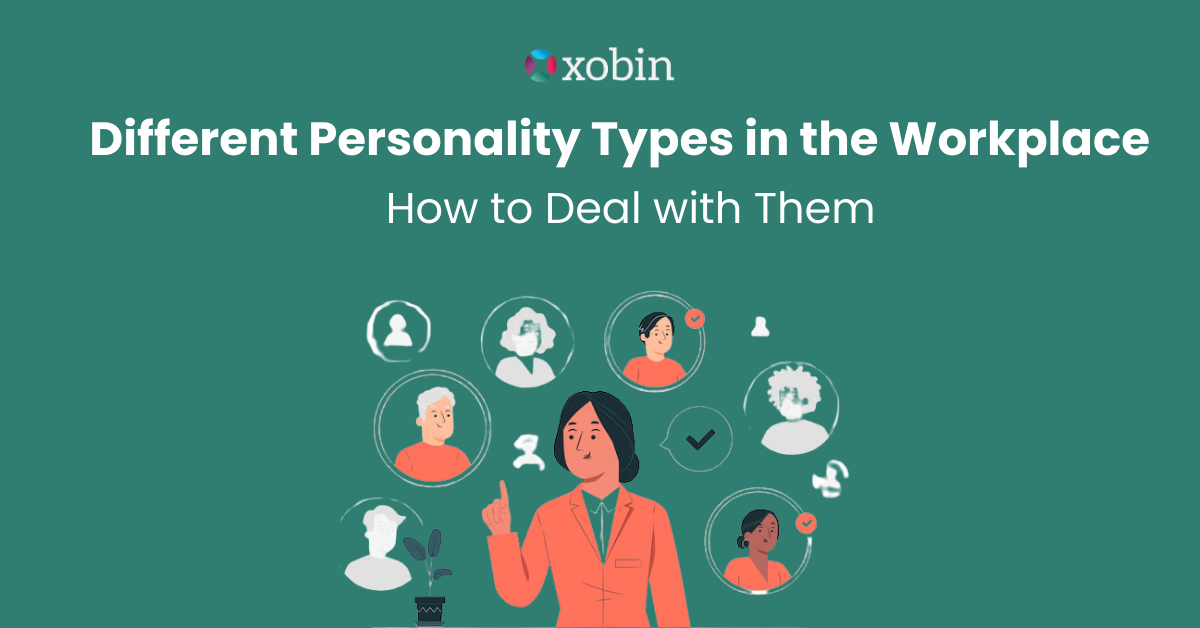Every workplace consists of individuals with unique personalities, strengths, and work styles. Some employees thrive in high-energy environments, while others prefer structured workflows. As a recruiter, understanding different personality types can help you make better hiring decisions, improve team dynamics, and boost overall productivity.
Table of Contents
When hiring, it’s not just about finding candidates with the right skills. It’s about ensuring they fit within your company culture. A mismatch in personality and work environment can lead to disengagement and high turnover rates. However, when managed well, a diverse set of workplace personality types can drive innovation and success. In this guide, we’ll explore the most common work personality types and provide actionable strategies on how to manage them effectively.
What is the Meaning of Personality Types?
Personality types refer to distinct patterns of thinking, behavior, and emotions that shape how individuals interact with others and approach work. Each person has a unique personality, but psychologists have categorized these traits into specific types to understand workplace behavior better. It influences communication styles, decision-making, teamwork, and leadership abilities. For example, some employees thrive in structured environments, while others prefer flexibility. Some are highly competitive, while others prioritize collaboration. Understanding personality types is crucial for hiring the right talent. With psychometric assessments, recruiters can assess candidates’ strengths, weaknesses, and work preferences accurately. This allows companies to place employees in roles where they can excel.
Understanding Common Personality Types

1. The Analytical Thinker
The Analytical Thinker personality type is a logical and detail-oriented individual who prefers working with facts, data, and structured processes. They excel in problem-solving, enjoy deep analysis, and thrive in environments where critical thinking is valued. However, they may struggle in highly unstructured workplaces or roles that require high emotional engagement.
Key Traits of Analytical Thinker Personality Type:
- Highly logical and data-driven
- Detail-oriented and precise
- Prefers independent work over teamwork
- Struggles with ambiguity and vague instructions
- Thrives on structured routines and clear expectations.
How to Spot Analytical Thinkers Using Psychometric Tests:
- High scores in logical reasoning test and problem-solving test
- Strong results in critical thinking assessments
- Prefers tasks that require deep analysis over social interactions
- Low preference for high-energy, fast-paced roles
How to Deal with Analytical Thinker Personality Type?
Managing Analytical Thinkers requires structured communication and logical feedback. Provide them with clear, data-backed instructions and avoid vague expectations. They dislike micromanagement but appreciate detailed feedback that highlights measurable results. Encourage them to participate in team discussions by allowing them time to process information before responding. If you need them to collaborate with others, assign them roles where they contribute their expertise without excessive social demands.
2. The Social Butterfly
The Social Butterfly personality type thrives in environments that involve networking, collaboration, and dynamic interactions. They are naturally outgoing, enthusiastic, and bring positive energy to any workplace. However, they may struggle with repetitive tasks, long periods of isolation, or highly analytical roles.
Key Traits of Social Butterfly Personality Type
- Extroverted and enjoys socializing
- Energized by teamwork and collaboration
- Struggles with solitary or monotonous work
- Highly persuasive and great at relationship-building
- Sometimes gets easily distracted by social interactions
How to Spot Social Butterfly Using Psychometric Tests:
- High scores in interpersonal skills and communication tests
- Excels in emotional intelligence assessments
- Prefers work environments with constant engagement
- Struggles with tasks requiring extended focus and isolation
How to Deal with Social Butterfly Personality Type?
To keep Social Butterflies engaged, provide them with opportunities to interact with colleagues, clients, or stakeholders. Assign tasks that involve teamwork, presentations, or customer engagement. If they are working remotely, ensure regular virtual check-ins to maintain motivation. Moreover, establish a structured work schedule with clear deadlines to prevent distractions. Encouraging them to take short breaks for social interactions can help them stay productive without losing focus.
3. The Independent Worker
The Independent Worker is a self-motivated individual who prefers autonomy over constant supervision. They take ownership of their tasks, work well alone, and deliver high-quality results without needing frequent guidance. However, they may struggle in environments that require excessive collaboration or daily meetings.
Key Traits of Independent Worker Personality Type
- Self-sufficient and highly disciplined
- Prefers minimal supervision and flexible deadlines
- Struggles with frequent team discussions or check-ins
- Works best in quiet, distraction-free environments
- Highly results-driven with a strong sense of accountability
How to Spot Independent Workers Using Psychometric Tests:
- High scores in self-motivation and time management assessments
- Prefers working in independent settings over team-driven environments
- Excels in tasks requiring minimal collaboration
- Low preference for roles with constant communication needs
How to Deal with Independent Worker Personality Type?
Give Independent Workers the freedom to manage their own schedules and projects. Assign them clear objectives but avoid micromanagement. They appreciate being trusted with responsibilities and deliver their best work when given flexibility.
While they prefer working alone, periodic check-ins can help ensure they stay aligned with company goals. Use email or written communication instead of constant meetings, and let them work at their own pace while keeping deadlines intact.
4. The Natural Leader
The Natural Leader personality type is confident, assertive, and thrives in high-responsibility roles. They enjoy making decisions, guiding teams, and driving projects forward. However, they may struggle in environments where they lack autonomy or are micromanaged.
Key Traits of Natural Leader Personality Type
- Goal-oriented and highly driven
- Enjoys leading and mentoring others
- Struggles with taking orders or following rigid structures
- Thrives in dynamic, high-stakes environments
- Prefers making decisions over waiting for instructions
How to Spot Natural Leaders Using Psychometric Tests:
- High scores in leadership and decision-making assessments
- Excels in strategic thinking and problem-solving tests
- Strong ability to motivate and inspire others
- Prefers fast-paced, challenging roles
How to Deal with Natural Leader Personality type?
To keep Natural Leaders motivated, provide them with leadership opportunities. Assign them responsibilities that allow them to take charge of projects or mentor junior employees. Avoid micromanaging them, as they prefer autonomy and decision-making power.
If they become too dominant in team settings, encourage them to listen to others and collaborate effectively. Constructive feedback should be framed as a way to enhance their leadership skills rather than limiting their authority.
5. The Creative Innovator
The Creative Innovator personality type thrives on originality and loves thinking outside the box. They bring fresh ideas to the table and excel in roles that require innovation. However, they may struggle with routine tasks and structured environments.
Key Traits of Creative Innovator Personality Type
- Imaginative and highly creative
- Enjoys brainstorming and problem-solving
- Struggles with strict rules and rigid processes
- Works best in flexible and dynamic environments
- Often challenges traditional ways of thinking
How to Spot Creative Innovators Using Psychometric Tests:
- High scores in creativity and innovation assessments
- Excels in divergent thinking and problem-solving tests
- Prefers flexible work structures over rigid frameworks
- Struggles with tasks requiring repetitive execution
How to Deal with Creative Innovator Personality Type?
To engage Creative Innovators, provide them with opportunities to explore new ideas. Assign them to brainstorming sessions or projects that require outside-the-box thinking. Avoid restricting them with excessive rules or rigid workflows.
Since they may struggle with deadlines, break down projects into manageable phases. Pairing them with structured thinkers can help balance creativity with execution.
6. The Perfectionist
The Perfectionist personality types are highly detail-oriented, striving for excellence in everything they do. They set high standards for themselves and others, often leading to exceptional work quality. However, their perfectionism can sometimes slow down progress, as they may struggle with delegation or moving on from tasks.
Key Traits of Perfectionist Personality Type
- Highly organized and methodical
- Obsessed with accuracy and precision
- Struggles with imperfect or rushed work
- Can be overly critical of themselves and others
- Prefers structure and well-defined processes
How to Spot Perfectionist Using Psychometric Tests:
- High scores in attention to detail and accuracy tests
- Prefers structured tasks over creative flexibility
- Struggles with ambiguity and rapidly changing environments
- Excels in tasks requiring deep concentration
How to Deal with Perfectionist Personality Type?
Perfectionists thrive in roles that require precision, such as finance, quality control, or research. However, their fear of making mistakes can lead to procrastination. To help them manage their workload effectively, set clear priorities and deadlines. Encourage them to focus on progress rather than perfection.
Since they may struggle with delegation, reassure them that trusting their team won’t compromise quality. Providing constructive feedback with appreciation for their efforts can boost their confidence and productivity.
7. The Empathetic Team Player
The Empathetic Team Player personality type is warm, supportive, and focused on maintaining harmony in the workplace. They excel at building relationships and fostering teamwork. However, their people-pleasing nature may sometimes make them hesitant to voice concerns or set boundaries.
Key Traits of Empathetic Team Player Personality Type
- Compassionate and emotionally intelligent
- Prioritizes teamwork and harmony
- Great at conflict resolution
- Sometimes avoids confrontation
- Can struggle with decision-making under pressure
How to Spot Empathetic Team Player Using Psychometric Tests:
- High scores in Agreeableness and Empathy.
- High scores in emotional intelligence assessments
- Excels in teamwork and collaboration tests
- Prefers varied and dynamic work over repetitive tasks
- Performs well in situational judgment tests
How to Deal with Empathetic Team Player Personality Type?
To support an Empathetic Team Player, create an inclusive work culture where they feel valued. Encourage them to share their opinions and provide constructive criticism when necessary. While their teamwork skills are valuable, help them develop assertiveness to avoid being taken advantage of. Provide training on boundary-setting and decision-making.
8. The Risk-Taker
The Risk-Taker thrives in fast-paced environments and is always willing to explore new ideas. They are bold, decisive, and driven by innovation. However, their enthusiasm for taking risks can sometimes lead to impulsive decision-making and overlooking potential downsides.
Key Traits of Risk-Taker personality Type
- Bold and highly confident
- Willing to take chances and try new approaches
- Thrives in fast-paced, high-stakes environments
- Can be impulsive and overlook details
- Prefers action over excessive planning
How to Spot Risk-Taker Using Psychometric Tests:
- High scores in creative thinking and risk-taking assessments
- Prefers dynamic, fast-moving work environments
- Measures their ability to assess risks logically.
- Behavioral Assessments evaluates their reaction to uncertainty and rapid decision-making
How to Deal with Risk-Taker Personality Type?
Encourage Risk-Takers to channel their boldness into calculated risks. Provide data-driven insights to help them make informed decisions. While their drive for innovation is an asset, introduce structured review processes to minimize unnecessary risks. Pair them with detail-oriented team members (such as Perfectionists or Analytical Thinkers) to balance decision-making.
9. The Conflict-Avoiding Peacemaker
The Conflict-Avoiding Peacemaker personality types prioritizes harmony and teamwork. They dislike confrontation and work hard to maintain a positive work environment. However, their reluctance to address issues directly can lead to passive-aggressiveness or suppressed frustration.
Key Traits of Peacemaker Personality Type
- Highly empathetic and diplomatic
- Avoids conflicts and uncomfortable conversations
- Struggles to say “no” and may take on too much work
- Prefers cooperative work environments
- Sometimes compromises too much to keep the peace
How to Spot Peacemaker Using Psychometric Tests:
- High scores in emotional intelligence and teamwork assessments
- Prefers collaborative roles over competitive environments
- Excels in negotiation skill test and mediation-based tests
- Struggles with decision-making under pressure
How to Deal with Peacemaker Personality Type?
To support Peacemakers, create an open communication environment where they feel safe expressing their concerns. Encourage them to develop assertiveness skills so they don’t feel pressured to agree with everyone. Assign them roles where their diplomatic skills are beneficial, such as HR, customer relations, or project coordination. However, ensure they’re not overburdened by always playing the mediator.
10. The Quiet Observer
The Quiet Observer personality type is introverted, insightful, and highly observant. They prefer listening over speaking and often provide valuable input when given the space to do so. However, their reserved nature may cause them to be overlooked in team discussions.
Key Traits of Quiet Observer Personality Type
- Thoughtful and deeply analytical
- Listens more than they speak
- Observes and processes information carefully
- Can be hesitant to share ideas openly
- Prefers meaningful one-on-one interactions over large group discussions
How to Spot Quiet Observers Using Psychometric Tests:
- High scores in introversion and attention to detail tests
- Excels in pattern recognition and analysis tasks
- Prefers independent problem-solving over group discussions
- Low engagement in interactive or leadership-based tasks
How to Deal with Quiet Observer Personality Type?
To manage a Quiet Observer, create an inclusive environment where they feel comfortable sharing their thoughts. Instead of pushing them to speak in large meetings, provide alternative communication channels (such as written feedback or one-on-one check-ins). Encourage them to contribute insights, as their observations are often highly valuable. Respect their need for quiet workspaces and avoid pressuring them into extroverted roles.
Assess Different Personality Types with Xobin!
Understanding personality types is crucial for building a productive and harmonious workplace. But identifying these traits accurately can be challenging without the right tools. Xobin offers scientifically validated psychometric assessments designed to help recruiters gain deep insights into candidate’s personalities, work styles, and behavioral tendencies.
Key personality traits that Xobin measure are:
- Interpersonal Traits
- Cognitive Traits
- Leadership Traits
- Work ethics traits
- Emotional Intelligence traits
- Conscientiousness traits and much more
If you’re looking for a smarter, more effective way to assess personality traits and build high-performing teams, Xobin’s psychometric testing software is the solution.
So what are you waiting for? Book a Personalized Demo today and unlock the full potential of your workforce!






